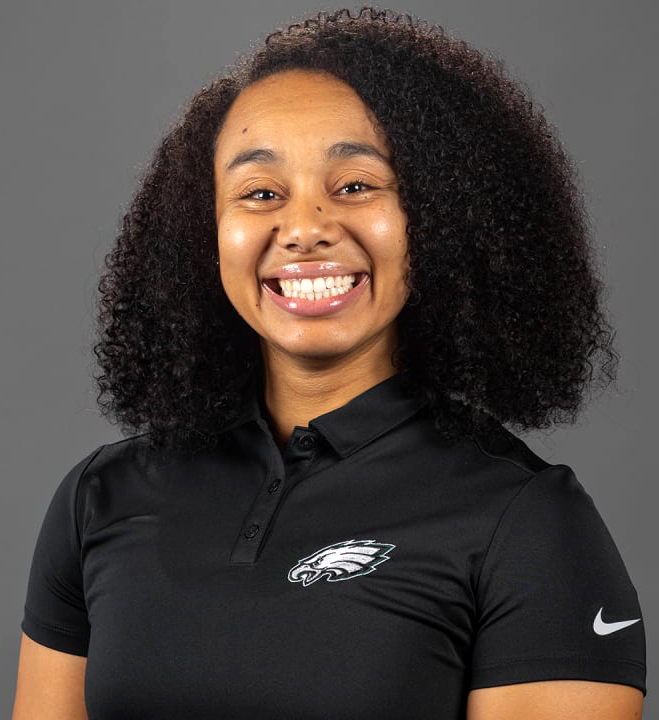Autumn Lockwood Becomes First Black Woman Coach To Win Super Bowl

The Philadelphia Eagles’ 40-22 victory at Super Bowl LIX was not just another championship win—it was a landmark moment in sports history. For Autumn Lockwood, the team’s associate performance coach, the victory made her the first Black woman coach to win a Super Bowl, a groundbreaking achievement that underscores the ongoing evolution of the NFL’s coaching landscape.
A Triumph on the Biggest Stage
Lockwood’s journey to this historic moment began years ago, but her victory came exactly one year after she became the first Black woman to coach in a Super Bowl—when the Eagles faced the Kansas City Chiefs in Super Bowl LVII but fell short. This year, however, Philadelphia dominated the rematch, and Lockwood stood among champions, celebrating the moment with a now-iconic locker room photo, hoisting the Lombardi Trophy in one hand and a victory cigar in the other.
View this post on Instagram
Her presence on the sidelines signifies more than just a win—it represents a shift in the representation of women and people of color in NFL coaching roles, a league where such opportunities have historically been scarce.
A Career Defined by Determination
Lockwood’s rise in the NFL is a testament to her dedication and expertise in sports performance. She holds a bachelor’s degree in criminal justice from the University of Arizona and a master’s in sports management from East Tennessee State University. Her career began in collegiate athletics, where she honed her craft in strength and conditioning at institutions such as the University of Houston, UNLV, and Arizona before making the leap to the NFL.
Her first role in professional football came in 2019 when she joined the Atlanta Falcons as a strength and conditioning intern. In 2022, she was hired by the Eagles as a strength and conditioning associate before being promoted to associate performance coach the following year.
While Lockwood’s success is a personal triumph, it also highlights the NFL’s ongoing struggles with diversity in coaching. As of the 2024 season, only six Black head coaches led NFL teams, and women remain significantly underrepresented in coaching roles. According to Sports Illustrated, Lockwood is one of only two Black women in an NFL coaching position, alongside Jennifer King of the Chicago Bears.
The NFL’s Diversity Challenge
The lack of representation of Black coaches and women in leadership roles has long been a point of contention for the league. While the NFL’s Diversity, Equity, and Inclusion (DEI) program has introduced initiatives to address this imbalance, progress remains slow.
NFL Commissioner Roger Goodell has publicly reaffirmed the league’s commitment to fostering diversity, stating,
“We got into diversity efforts because we felt it was the right thing for the National Football League, and we’re going to continue those efforts. It reflects our fan base, our communities, and our players.”
While the NFL has increased its diversity hiring in recent years, systemic barriers persist. Between 2019 and 2023, there were only three Black head coaches in the league. That number has since risen to seven, demonstrating incremental progress but still falling short of true equity.
Essence magazine recognized Lockwood’s achievement as a turning point for the league, stating:
“Her groundbreaking victory represents a seismic shift in a league that has long struggled with representation. In a sport where coaching staffs have been overwhelmingly male and white, Lockwood’s success carves a path forward for Black women aspiring to break barriers in professional football.”
The Road Ahead: A Future of Inclusion in the NFL
While Lockwood’s victory is a significant milestone, the fight for inclusion and equity in professional football is far from over. The hope is that her success will inspire more women and people of color to pursue coaching careers—and that organizations across the league will actively seek to break down hiring barriers.
The NFL’s DEI programs have made a difference, but their impact is only as strong as the commitment of team owners, executives, and hiring committees. If real change is to happen, the industry must continue prioritizing equal opportunities for women and minorities in coaching and leadership roles.
One day, perhaps, the Lombardi Trophy will be handed to the first-ever female head coach to win a Super Bowl. While that may still seem like a long way off, Lockwood’s remarkable journey proves that progress is not just possible—it’s already happening.
As the confetti settled on Super Bowl LIX, Lockwood stood as living proof that barriers can be broken. Her victory is not just about football—it is about reshaping the narrative of what’s possible for Black women in professional sports.


